At the beginning of March we were still vaguely optimistic about leaving Wickenburg at the end of the month. Unfortunately that’s not quite how things worked out: we finally made our escape at the end of April, four months after our arrival.
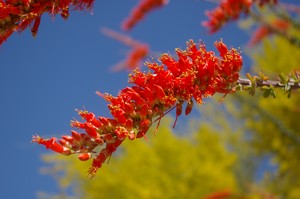 Sterling’s Achilles tendon remained center stage: twice weekly visits to the physical therapist structured our time. For a while, it appeared that he was making some minimal progress. He had been out of “The Boot” for about a week when one of his stretching exercises did further damage and relegated him back to his favourite footwear. By the end of April, he was able to walk for about ten minutes. We were not overly happy about the situation.
Sterling’s Achilles tendon remained center stage: twice weekly visits to the physical therapist structured our time. For a while, it appeared that he was making some minimal progress. He had been out of “The Boot” for about a week when one of his stretching exercises did further damage and relegated him back to his favourite footwear. By the end of April, he was able to walk for about ten minutes. We were not overly happy about the situation.
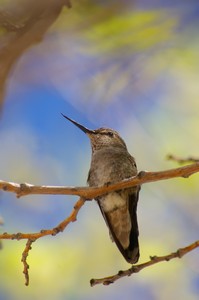 Throughout much of March and April we did not venture very far. The North Ranch Escapees Park continued to be our little world as spring heralded the arrival of nesting birds, swarming bees and the bright colors, dramatic flowers and heady scents of various desert plants. These were a welcome distraction especially once Sterling was able to hobble the five minutes to the cultivated cactus garden.
Throughout much of March and April we did not venture very far. The North Ranch Escapees Park continued to be our little world as spring heralded the arrival of nesting birds, swarming bees and the bright colors, dramatic flowers and heady scents of various desert plants. These were a welcome distraction especially once Sterling was able to hobble the five minutes to the cultivated cactus garden.
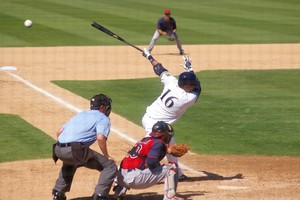 The highlight of this period was a visit from Eric and Jeanette in mid-March and in-spite of our somewhat subdued spirits we thoroughly enjoyed the time and even ventured as far as Phoenix to see the Milwaukee Brewers play the Cleveland Indians in a Spring Training game. I am ashamed to say that this is the first baseball game I have been to and according to Sterling this will go badly for me when I apply for citizenship. He conveniently glosses over the fact that he has never been to a cricket match and yet succeeded in getting a British passport many years ago.
The highlight of this period was a visit from Eric and Jeanette in mid-March and in-spite of our somewhat subdued spirits we thoroughly enjoyed the time and even ventured as far as Phoenix to see the Milwaukee Brewers play the Cleveland Indians in a Spring Training game. I am ashamed to say that this is the first baseball game I have been to and according to Sterling this will go badly for me when I apply for citizenship. He conveniently glosses over the fact that he has never been to a cricket match and yet succeeded in getting a British passport many years ago.
 The game itself is remarkably like the game of rounders I played as a child although baseball is wrapped in all the seriousness and ritual that a professional performance demands. On the other hand, nearly all American sport entails some aspect of “family entertainment” and this is no exception. The Brewers adopted a Latin American mantle and became “Los Cerverceros” for the day while the traditional Brewers Sausage Race - yes, you read that correctly - featured none other than “Chorizo”.
The game itself is remarkably like the game of rounders I played as a child although baseball is wrapped in all the seriousness and ritual that a professional performance demands. On the other hand, nearly all American sport entails some aspect of “family entertainment” and this is no exception. The Brewers adopted a Latin American mantle and became “Los Cerverceros” for the day while the traditional Brewers Sausage Race - yes, you read that correctly - featured none other than “Chorizo”.
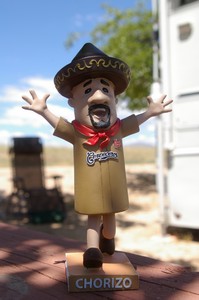
While there are many worse places to be stuck than Wickenburg, four months in one place is not our preferred style of full-timing. We desperately wanted to move on but had to face the fact that our usual style of travel was not an option. Staying a few days in one place, hiking, cycling and getting out and about requires a level of mobility denied to Gimpy McHobblefoot. We needed an alternative.
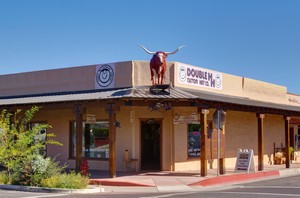
Given the amount of time we have spent in national and state parks over the years, we have often talked about the possibility of camp-hosting, feeling that maybe we could support the parks in a more active way. Camp-hosts are offered a campsite in return for unpaid work. We decided that I would apply for a camp-hosting position for a couple of months giving the Achilles some extra healing time. At this point we were still naively hoping for some substantial improvement. So, at the end of April we finally moved, heading for Brantley Lake State Park in southern New Mexico.
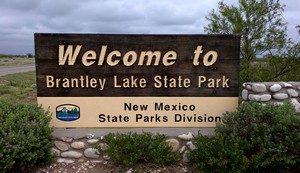
The park itself is a fairly nondescript reservoir-based state park created back in the eighties when the dam was built. Flooding on the Pecos River in 2013 and 2014 had caused damage to the infrastructure further downstream, and as a consequence water was being held back at Brantley, resulting in one of the only full reservoirs we’ve seen in the west over the last few years.
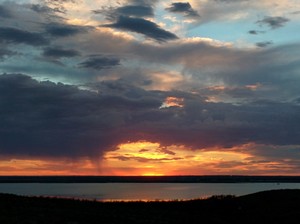
The spring flowers were in full bloom when we arrived, carpets of purple, white and yellow adding a splash of colour to the muted tones of the desert evergreens. State parks appear to have a very different view of environment management than say the national parks: wild flowers in the campground are viewed not as an asset but but as weeds and are promptly dispatched. The primary objective is for a tidy, well-tended look and wild flowers, once past their prime, will undermine this aim.
Brantley seems to be a place of dramatic but short lived explosions in populations. The heavy rains of the previous autumn were responsible for the density of wildflowers, and the plentiful supply of food at this level in the food chain resulted in a reaction along the links.The most annoying of these was the sudden appearance of huge numbers of large moths that somehow found their way into the camper.
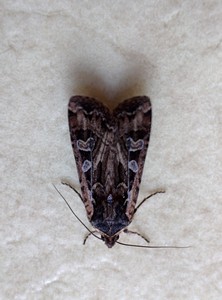 Night after night our evening’s entertainment consisted of catching and relocating anything upwards of thirty of these flying irritants. Thinking we had dispatched the last of them, we’d go to bed only to hear and feel the wing beats of another wave arriving to annoy us. We eventually tracked down their point of entry to the runners under the slide-out and once we’d blocked these up our evenings returned to their more peaceful, less frantic character.
Night after night our evening’s entertainment consisted of catching and relocating anything upwards of thirty of these flying irritants. Thinking we had dispatched the last of them, we’d go to bed only to hear and feel the wing beats of another wave arriving to annoy us. We eventually tracked down their point of entry to the runners under the slide-out and once we’d blocked these up our evenings returned to their more peaceful, less frantic character.
The moths were followed by a spider infestation, various parts of the camper becoming festooned in strings of egg sacs. Fortunately the parents did not appear to be interested in the inside of the camper. The sheer arachnid numbers led one visitor to suggest that Spider Park would be a more appropriate name for Brantley.
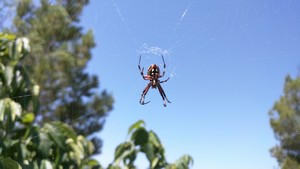
A one-off swarm of lace wings rising into the evening sky was a lot less concerning than the next arrivals: tarantula hawks. Attracted by the flowering mesquite trees around our campsite, these extremely large wasps with their bulky black bodies and orangey wings reportedly deliver one of the most painful stings of all insects. It was therefore hardly surprising that Sterling was somewhat disconcerted when three of them got into the truck one evening when he had the doors open. Being the coward I am, I remained safely ensconced in the camper leaving Sterling to his fate, trying to entice them back out. He saw two of them leave but wasn’t a hundred percent sure that the final visitor had exited. We were tentative in opening the truck the next morning and setting off into town but gladly cannot report on exactly how painful the sting is.
The mammalian section of the food chain was not to be outdone and who better to breed like rabbits than the rabbits themselves. We saw more jackrabbits than you could shake a stick at and it became difficult to walk round the campground without nearly tripping over the cutest pocket-sized cottontail bunnies. As the temperatures climbed into the low hundreds in the afternoons, even the rabbits found it too much and were to be found in the shade, flattened out on the ground: referred to as ‘melted bunnies’ by Troy, one of the park staff.
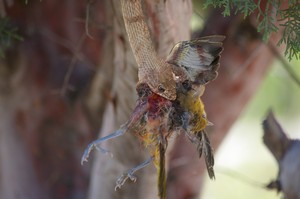 We had been told that the dramatic rabbit numbers were likely to prompt an increase in the snake population, and while bunny sized snacks were readily available the only real reptilian action that we saw was in a tree. The photographs tell the story and without going into all the gory details, it involved a Western Kingbird (about the size of a blackbird) and a Western Coachwhip. The Coachwhip is not a venomous snake and while it was clear early on that the bird wasn’t likely to get free, it was a long drawn-out process. Numerous Orioles and other Kingbirds mocked the snake but to no effect, the hapless bird was firmly clenched in its mouth. The snake didn’t let go until the bird was dead. As the prey fell to the ground, the Coachwhip slithered down the trunk and searched the area beneath the tree. Having located the bird, the snake made off into the undergrowth to enjoy its lunch in peace, away from our prying eyes.
We had been told that the dramatic rabbit numbers were likely to prompt an increase in the snake population, and while bunny sized snacks were readily available the only real reptilian action that we saw was in a tree. The photographs tell the story and without going into all the gory details, it involved a Western Kingbird (about the size of a blackbird) and a Western Coachwhip. The Coachwhip is not a venomous snake and while it was clear early on that the bird wasn’t likely to get free, it was a long drawn-out process. Numerous Orioles and other Kingbirds mocked the snake but to no effect, the hapless bird was firmly clenched in its mouth. The snake didn’t let go until the bird was dead. As the prey fell to the ground, the Coachwhip slithered down the trunk and searched the area beneath the tree. Having located the bird, the snake made off into the undergrowth to enjoy its lunch in peace, away from our prying eyes.
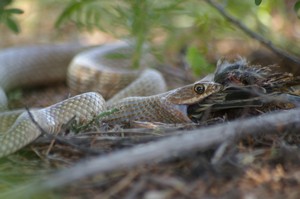
The camp hosting experience was an interesting one. Over the nine weeks we were there I averaged thirty one hours a week for which we got a free campsite, worth eighteen dollars a day. This was supplemented by the coins I picked up around the campground and I had just enough to buy a pint of beer by the end of our time, largely thanks to Kyle, one of the seasonal staff, who donated coins he’d found down by the boat ramp.
The role is primarily one of putting out reservation tags, checking for evidence of payment, answering queries, picking up rubbish and cleaning the campsites after each group of visitors. The last of these was the bulk of the work and there was a huge difference in how sites were left. A site used by a boy scout troup looked as though nobody had used it, every piece of rubbish removed, while other sites could take over half an hour to return to a state where someone else could use them. The cleaning itself was strangely satisfying and the cleanliness of the campground became a matter of pride.
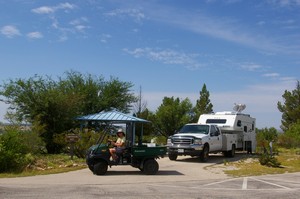
For the first month or so, I was the only host and this initially meant no days off and never really being off duty. It is difficult to completely relax in this situation and being woken by someone hammering on the side of the camper at 11.30 at night demanding to know why I hadn’t put their tents up only added to this feeling. For some reason that remains a mystery, these people had turned up expecting tents and camping equipment to be waiting and ready. They were extremely put out and none too polite when I explained that this was not a service we provided.
People’s attitude towards the park and their use of it varied dramatically. While New Mexico state parks are some of the most reasonably priced and well maintained parks in the whole country some visitors had an unfounded sense of entitlement to either free or discounted camping. The reasons for this expectation could be anything from being a veteran, a state employee or perhaps most bizarrely, buying a car whilst on vacation and believing they should not have to pay the extra vehicle fee as they didn’t have the vehicle when they made the reservation. People can become extremely rude when their sense of entitlement is not met and it was certainly one of the more trying aspects of the role.
Perhaps the most ‘amusing’ of these instances was a grumpy Russian who accused us of running a totalitarian regime in the park. He assured me that he had left the Soviet Union years ago to escape such strictures on his life although I was never entirely sure exactly how we were mirroring the former communist stronghold.
On the other hand, the vast majority of people using the park were friendly and pleasant. One particular couple even delivered a tray of freshly baked apple turnovers as a thank you for my volunteering role. What a delight!
So, would I do it again? Probably. I’d be a lot more savvy in picking the next location: I wouldn’t go somewhere I was the sole host and we’d prefer a location slightly nearer a town but on average I enjoyed the experience and may well volunteer somewhere else.
It had become clear some weeks into our stay at Brantley that the Achilles was not improving as we had hoped and we embarked on a search for another treatment option. We settled on a micro-surgery option and tracked down a podiatrist in the Salt Lake area with a lot of experience in the technique. We left Brantley with a little over a week to have a break and a bit of a wander before the initial appointment with the doc.